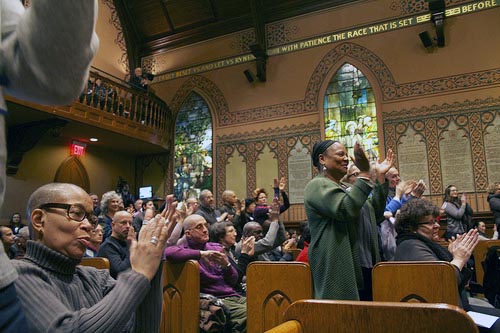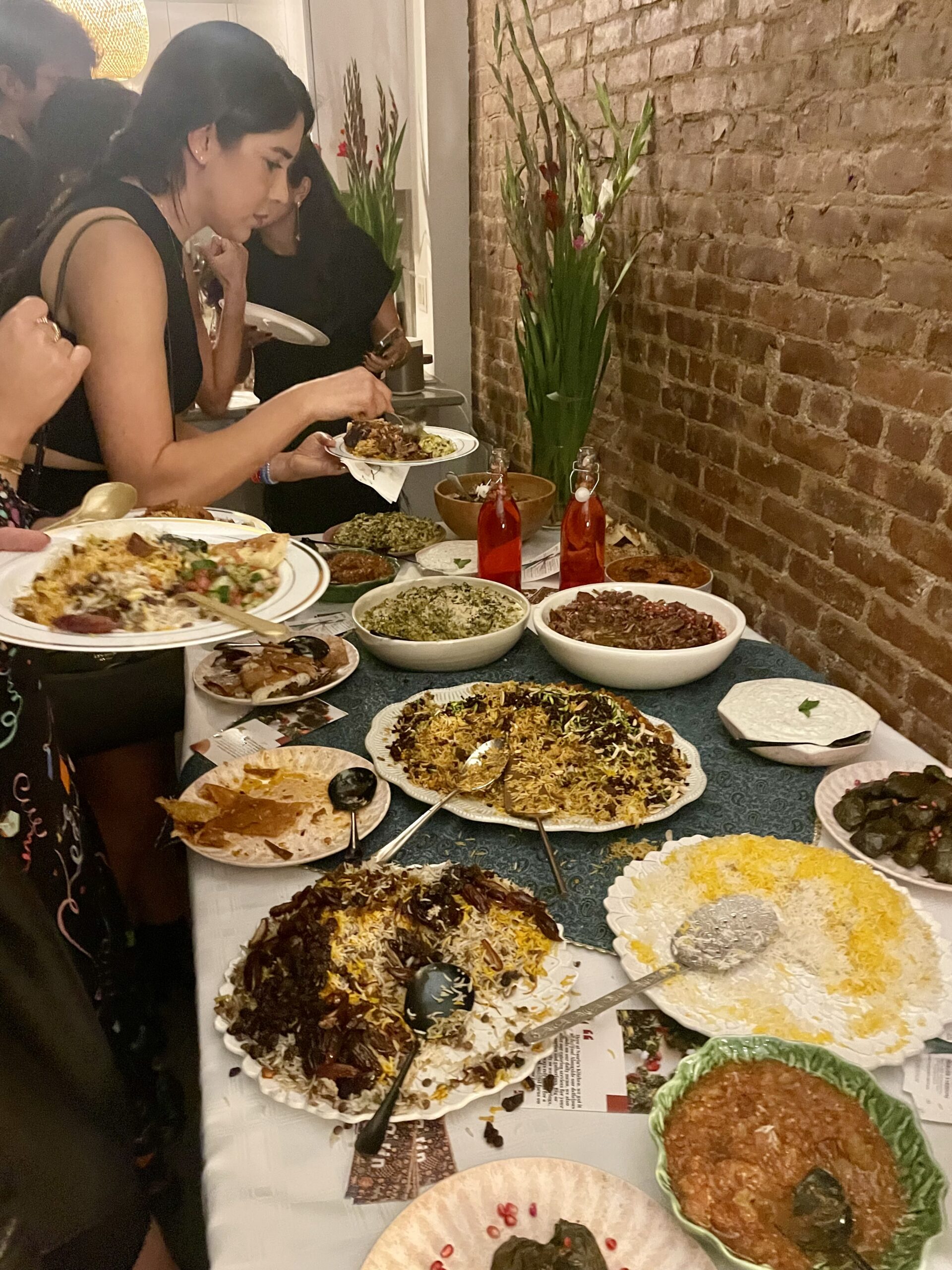
Middle Church members clap to music during Sunday’s worship. The Church has over 800 members, who are various races, sexualities and genders. Photo credit: Leticia Miranda.
The topic of religion and reproductive rights has taken a new turn with a recently launched national campaign to talk about controversial reproductive health issues directly from the pulpit.
The campaign called, “It’s Time,” plans to equip faith leaders with new curriculum, sermons and engagement tips available this March to “change the conversation on faith and reproductive choice,” according to the Religious Coalition for Reproductive Choice’s website, an interfaith coalition based in Washington, DC. But even with its novel goals, the campaign’s mainly liberal church base struggles to meet the needs of its members who look outside church for guidance around their reproductive health.
Selima Jumarali, 28, a member of the Middle Church in the East Village, Manhattan, which is a protestant-based organization with a social justice framework, said that for her spirituality and faith are not the strongest influences over her reproductive health decisions.

“Social justice is my spirituality,” said Selima Jumarali, 28. She says she chooses to seek guidance on reproductive health issues outside of her church. Photo credit: Leticia Miranda
“For me it’s more my social justice that guides my reproductive decisions than my faith,” she said. “It’s more about investigating myself as a woman and the choices I have and the power I have over my body that would lead me to decisions about my reproductive health rather than what a text says or what a religious leader tells me.”
Jumarali said she attends Middle Church for a spiritual network and a way to learn about social justice efforts. She has more personal connections outside of church where she might discuss issues of reproductive health.
Middle Church member Clara Ibarra said, she thinks that the church is a supportive place to talk generally about reproductive health decisions, but likewise would choose to seek counseling elsewhere if she faced a serious life decision like whether or not to terminate a pregnancy.
“Independently of my faith, I try not to put myself in that situation so I take measures to make sure that doesn’t happen,” said Ibarra, who has attended Middle Church since 2008. “I don’t know if it’s religious. I think it’s more like who I am. I think if you get to that place this would be an open community to support you in that process whatever your decision is.”
This gap between a progressive church’s social justice mission and its actual practice meeting the needs of women is where Rev. Kelli Clement, the executive director of the Minnesota Religious Coalition for Reproductive Choice and a community Minister in Minneapolis, Minnesota, hopes to fill through the campaign’s curriculum and their own organization’s training tools.
“I know tons of people who are faithful and pro-choice but can’t connect those two things,” she said. “When we are able to connect those two things, our spiritual journey and reproductive lives open up. We understand ourselves more holistically.”
In February, Minneosta Religious Coalition for Reproductive Justice, the state affiliate to the national organization, launched the first of several new trainings for clergy across the state on how to support their congregants through reproductive loss. That includes everything from abortion to miscarriage to sexual trauma. She herself benefitted from a Religious Coalition for Reproductive Justice training when two separate women called her office two years ago after feeling triggered by conservative attacks on women who become pregnant through rape and choose abortion.
“They knew they wanted to talk about their experience, but not in a therapeutic setting,” said Clement. “They wanted to help make sense of their experience and triggers in light of their faith. It felt wonderful to be able to have this delicate conversation and be a part of it.”
Jacqueline Lewis Senior Minister at Middle Church said that, like Clement, members come to her for spiritual guidance after other reproductive losses like a miscarriage. She rarely hears from congregants who chose to terminate a pregnancy in part because of their fear of judgment, she said.
“I don’t think anyone does it lightly so there’s a space right there for compassion and for prayer and acknowledging the toughness of the decision,” said Lewis. “What should happen from the church is a blessing and prayers for peace. The church’s job is to comfort those who mourn and help people make the best ethical decisions for their life circumstances.”
Not all faith leaders are as comfortable talking about sensitive topics like abortion in a sermon let alone as a confidant to one of their members. Some of the campaign’s advocates say that’s where these new tools can help clergy support their members who do look to their church institutions for guidance.
“As people of faith, we have been many times so reluctant to be present in the wholeness of people who have sexuality and in their brokenness when they are dealing with challenging issues,” said Clement. “That’s why as people of faith it’s important for us to be present with people in their totality.”

Susan Davis, 57, has attended Middle Church since 2004. She says that she appreciates the church's social justice lens to faith. Photo by Leticia Miranda
Middle Church member Susan Davis,57, discusses her journey in understanding reproductive rights.

